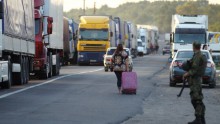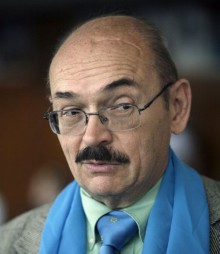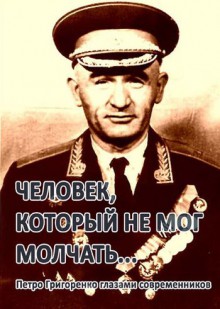Our last conversation with Andrii Hryhorenko started with the talk about the book titled Everyone Chooses for Themselves... In Memory of a Prominent Human Rights Activist General Hryhorenko, which had been published the day before that in Moscow (see article “Freedom is not given for nothing” in Den’s No. 109 of June 18, 2014). Since that time, a more complete version of this collection of reminiscence by his contemporaries about Major General Petro Hryhorenko, famous participant of the dissident movement, the founder of the Ukrainian Helsinki Group, and a member of the Moscow Helsinki Group, came out of print in Ukraine. Under the title The Man Who Could Not Remain Silent, so far only available in Russian, it was presented at the Forum of Publishers in Lviv.
In a conversation with The Day, the son of this famous person, Andrii Hryhorenko, speaks about the difference between the two editions. The conversation has also been dedicated to other relevant topics, in particular the Ukrainian policy concerning the annexed territories and the reform of the armed forces.
Andrii, have you already read the reviews of the first readers of the new edition? Do you plan any other projects aimed at comprehension and arranging of your father’s heritage?
“The Ukrainian edition, which is the fullest to date account of the memoirs about Petro Hryhorenko, has already received a positive feedback from the visitors of the Publishers’ Forum. As I said earlier, the collection features articles originally written in three languages – English, Ukrainian, and Russian. The Man Who Could Not Remain Silent, being the first Ukrainian edition, is published in Russian. All translations from English and Ukrainian were made by me, as well as the brief biographical and editorial notes. Previously, when publishing the collection in Russia I had to make certain compromises, and also used the help of Igor Reif, my old friend from Moscow, who served as a co-compiler of that edition. Fortunately, it had been published before the Russian-Ukrainian war has started – I’m afraid that in today’s Russia the collection would have never seen the print. The Ukrainian edition is not only more complete; it is also published under the original name, as in Ukraine I had no need to exclude or amend anything. Due to its large volume, the Ukrainian edition comes in two books – but the collection, certainly, does not include the entirety of all the memories about the General. I have tried, on the one hand, to avoid repetition, and on the other to make the portrait of one of the most famous Ukrainian patriots as lively as possible. Whether I succeeded or not, it is for the reader to judge.
“As for the other projects, I’m afraid that I have more of them than I am able to carry out. Take, for example, the collection The Man Who Could Not Remain Silent. I was hoping to publish it on the centenary of my father’s birth, which was in 2007 – but now it is 2015. In addition, I had planned to print three editions simultaneously: in English, Ukrainian, and Russian; but at the moment I have neither energy nor finances to make Ukrainian and English variants happen. I would also like to find someone who would be able to capture the memoirs of Yurii Grimm about the Serbsky Institute on film, as well as make a series of TV movies on Petro Hryhorenko’s biography. I am also working on a book about the first legal case my father faced – one of an underground organization headed by him. Apart from that, I bear the main burden to keep the General Petro Hryhorenko Foundation operational. We were all much younger when the Foundation was created, but time takes its toll. Henrikh Altunian, Nadia Svitlychna, Mark Elbaum, Leonid Pliushch, Yevhen Sverstiuk, and several other Foundation’s activists and friends have passed away, and others are much older and not at all in the best health. And so it goes.”
“ANY ACHIEVEMENTS IN RESTORING THE CULTURE OF CRIMEAN TATARS ARE SYSTEMATICALLY DESTROYED BY THE INVADERS”
It has already been one year and a half of the occupation of Crimea. All this time, Russia has made attempts to “integrate” the Crimean Tatars left in the peninsula. The Russians resort to repression, threats, intrigues, and attempts to split the Crimean Tatar movement. How do you assess the current situation of the Crimean Tatars in Crimea? Is Ukraine, in your opinion, making everything that is needed to protect them?
“The problem of Crimea and the Crimean Tatars is one of the most sensitive issues of the current Russian-Ukrainian war. Long before Russia’s direct attack on Ukraine, since literally the first steps of the newly acquired Ukrainian independence, the topic of the Crimean Tatar repatriation and rehabilitation has drawn ambiguous attitude. The Russian-speaking population of Crimea, the majority of which had either immigrated after the deportation happened, or had been the descendants of those who immigrated in this way, has been, putting it mildly, hostile to the idea of the repatriation. Russian propaganda added more oil to the fire, falsely declaring that the Crimean Tatars were going to expel the Russian settlers from their homes and commit other acts of violence. Ukrainian government was heroic enough to have recognized the deportation as genocide, but at the same time, they did not recognize the Crimean autonomy as a national autonomy of the Crimean Tatar people, nor did they officially acknowledge the Mejlis and the Kurultai, although these institutions were accepted de facto. The Crimea Tatar and Ukrainian cultures were reviving – albeit very slowly, even unreasonably so. But we should pay tribute to the activists of the Crimean Tatar and Ukrainian communities in their efforts to revive Crimean education and media in Ukrainian and Tatar languages, and, moreover, doing so with a minimum support from the Ukrainian government. At the same time, the attitude to repatriates had also been changing, as they became accepted as firm supporters of non-violent action and tireless workers. Now we know that more than 60 percent of the Crimean population has boycotted the so-called referendum, organized by the occupational Crimean authorities.
“Speaking about the pre-war situation, it is impossible to avoid the issue of the national defense. Back in 2002, now it seems so distant, my friend Mykola Horbal had said in his speech on the second Hryhorenko’s readings: ‘I do not believe in the patriotism of an army that speaks the language of the colonizer. I do not believe in fighting efficiency of an army that has no concise military doctrine developed; a doctrine, which would expressly define the potential adversary. I believe that Russian imperialism to this day remains the most dangerous enemy of the Ukrainian statehood. The army that understands only how to march smoothly through Khreshchatyk while the Russian President Vladimir Putin smiles slyly standing alongside the President of Ukraine on the podium, is only good for, I think, a coordinated surrender, not for repelling the aggressor.’
“The bitter words of my friend turned out to be prophetic: a few dozen Russian commandos seized the building of the Crimean Verkhovna Rada, with the Crimean police and Ukrainian armed forces doing nothing to prevent the outbreak of the Russian aggression. Should it be reminded that the armed forces exist primarily to defend the country and its citizens from the foreign aggression? Alas, the Ukrainian army was not ready to do precisely that at the time. What’s worse, the administration of President Yanukovych has provided the most potentially dangerous enemy with a virtually unlimited lease for the naval base in Crimea, which the Russians were happy to use as a springboard to launch an attack on Ukraine and occupy the peninsula.
“There are no words to describe how touching and at the same time painful was the sight of Ukrainian soldiers singing the national anthem. Yet, ladies and gentlemen, I need to say that the armed forces are not a song and dance ensemble – it is the shield and the sword of a country. In other words, the Ukrainian government had failed to fulfill its function to protect the Ukrainian citizens in Crimea, simultaneously demonstrating to the aggressor the lack of combat prowess in the troops and the incompetence of the military command. I think there is no need to explain that the Crimean campaign had inspired the Russian leadership to extend the war and mount the aggression in the eastern Ukraine.
“The occupation and the second Russian annexation of Crimea is a tragedy for the whole country, but especially so for the Crimean Tatar people, who find themselves once again at the mercy of those who have been trying to exterminate the indigenous people of Crimea and to seize their land for decades. Any achievements in restoring the culture of the Crimean Tatars are systematically destroyed by the invaders. Mejlis is outlawed, its leadership is partly expelled from Crimea, partly arrested, and partly murdered under mysterious circumstances; Crimean Tatar and Ukrainian-language media are systematically destroyed. Needless to say that the restoration of historical place names under the occupation regime is simply impossible.”
“CIVIL BLOCKADE OF CRIMEA IS THE RIGHT MOVE ON THE WAY TO RESTORE THE TERRITORY TO UKRAINE”
“The criticism of mistakes from the past should be a guiding light to make things right. To the credit of the incumbent Ukrainian authorities, certain steps in order to rescue the Crimean Tatar culture and national life have been made and, hopefully, the authorities will expand on it. Mejlis has already resumed operation in mainland Ukraine; the Crimean Tatar TV-channel ATR is broadcasting, again from the continental Ukraine; radio ‘Meydan’ was also restored. President of Ukraine has established the Advisory Committee on the affairs of the Crimean Tatars, which is headed by Mustafa Dzhemilev (Abdulcemil), veteran Ukrainian MP and the nationally recognized leader of the Crimean Tatar people. He is one of the two representatives of the Crimean Tatar people in the Verkhovna Rada of Ukraine, alongside Refat Chubarov, Chairman of Mejlis.
“However, the issue remains open: are all these positive steps enough to restore Ukrainian territorial integrity and liberate the occupied territories? Unfortunately, they are not. Those who follow the media coverage regarding the Crimean occupation are well aware that the Western media and politicians push the issue of Crimea into the background, as if they are acknowledging the seceding of the peninsula from Ukraine. Irresponsible Western politicians like Berlusconi visit Crimea, and with no remorse whatsoever drink priceless Crimean collection wine with the Russian President Putin.
“Despite the fact that Crimea has been under the Russian control for only 171 years compared to the centuries-old history of the peninsula, some unscrupulous ‘historians’ and politicians claim that Crimea has always been Russian. And yet they simply hush up the fact that since the first Russian annexation of Crimea, the Russian colonial authorities had been conducting a systematic depopulation of the peninsula and replacing the native population with the Russian-speaking settlers. Alongside the depopulation process, in Crimea there had been a systematic policy of erasing the historical topographic names and replacing them with Russian ones.
“The same policy was renewed after the second Russian annexation of Crimea. Knowing the historical nature of the Russian colonialism, one should assume that putting an end to the Russian occupation is not a trivial matter, and Ukraine and its leadership need to come up with extraordinary efforts in the fields of the international diplomacy and the economic pressure against the aggressor. The situation, in which the occupied territory of Ukraine is receiving the supply of food, energy, and fresh water from Ukraine seems incomprehensible. Some say that this policy should be continued, because otherwise the Ukrainian citizens who find themselves under occupation would suffer. But for some reason no one has an idea that the occupied population is suffering the most from the very continuation of this occupation under the repressive regime.
“It seems to me that the idea of the civil blockade of Crimea, offered by Chubarov and Dzhemilev, is the right move on the way to restore the territory to Ukraine. I would add to this the increased pressure towards the Western partners of Ukraine on behalf of the Ukrainian diplomacy. Ukraine should also initiate a program to restore the historical topographic names, and bring up criminal charges against the traitors and collaborators.
“I do not pretend to offer a comprehensive recipe to end the occupation, but any inaction would mean a betrayal to the national interests of Ukraine.”
At one time, General Petro Hryhorenko had sacrificed his high social status in order to fight for truth and justice. Today, whole units of the Russian army are involved in a secretive, illegal warfare against a neighboring state. Discontent is brewing within the ranks of the military, many refuse to “travel” to Ukraine – nevertheless, no one, even among the officers, has the courage to openly stand against the criminal orders of the command. What do you think, why is it so?
“I would have objected to the definition of the Russian-Ukrainian war as a secretive one. The war today comes in two forms: in Crimea it’s an open Russian invasion and an annexation of a foreign state’s territory; and in the east of the country it’s an invasion disguised as a ‘popular uprising.’ I do not know who should fall for that fraud, but I am convinced that the Ukrainian society, as well as the Ukrainian authorities, should certainly be aware of the fact that it is Russia who fights against Ukraine.
“As for the lack of vocal protests on behalf of the Russian officer staff, the subject can long be speculated upon. I can only express my own, purely unprofessional, opinion.
“Whereas it is true that in Soviet times only one general came up to speak against injustice and political repression, it should not be forgotten that he was not the only Soviet officer who raised his voice against the regime. Indeed, the other officers were lower in rank and mostly alone, nevertheless, they existed. Not all of them are known even to this day – and as well we might not be aware of today’s protests. And to summarize my commentary, I also want to note that a protest against a totalitarian or authoritarian regime requires much courage, which, alas, is not a common occurrence.”
“THE CURRENT RUSSIAN-UKRAINIAN WAR MAY BE QUALIFIED AS A COLONIAL ONE”
Petro Hryhorenko has repeatedly criticized the methods of warfare characteristic to the Soviet army. Today, the new resurgent Ukrainian army is generally trying to move away from outdated and inefficient Soviet methods. How do you assess the reforms that have been carried out in the Armed Forces of Ukraine for the past year and a half, and a new military doctrine, which regards Russia as the principal enemy?
“I am, of course, following closely all the developments in Ukraine, including the reforms in the armed forces. However, in no way I am a military expert. But as a man who is yet not devoid completely of the military knowledge, I consider the desire to bring the Ukrainian armed forces closer to the NATO standards to be a very positive and healthy step. My only concern is a heavy burden of ‘Sovietness,’ weighing down the whole Ukrainian society. It includes the all-encompassing corruption, the carelessness and negligence, and many other sins of our common past. Nevertheless, I remain optimistic and confident that the patriotic, combat-ready, agile, and highly professional Ukrainian army and navy will be built in the near future, and that they will manage a fitting repulse to any aggressor.
“I’m 100 percent sure that the revision of the Ukrainian military doctrine is long overdue, and the definition of Russia as the principal threat to Ukrainian independence and territorial integrity is not only long overdue, but, if I may say so, comes a bit too late. I can only congratulate Ukraine on the fact that this most apparent thing has finally been recognized in the official military doctrine of the country.”
Today’s Russia, as it was the case with the Soviet Union, is in fact a colonial country. Many indigenous peoples are subject to harsh assimilation, and some even find themselves on the verge of extinction. Any national movement is perceived negatively, as an anti-Russian. Hypothetically assuming, what is the form of a statehood in which Russia would be able to exist freely, democratically in the future? Is it confederation, federation – the real one, not fictitious as it is now – or something else?
“Shortly after the collapse of the Soviet Union there was for some time a hope that Russia’s colonial past will be overcome. Yet this hope turned out to be vain. The initial steps towards the federalization of the country were quickly phased out and replaced by the construction of the so-called ‘vertical of authority,’ which inevitably led to the revival of traditional authoritarianism and chauvinism. And the colonial wars then were not long in coming. In particular, the current Russian-Ukrainian war can as well be described as a Russian colonial one.
“I am not going to predict what the future holds for Russia. If the present-day trends continue for long enough, Russia is likely bound for the disintegration, possibly accompanied by a serious bloodshed. If Russia finds enough healthy forces within in order to turn the country away from the present disastrous way, we might have a hope that the chauvinistic and colonial past will be overcome, and that the non-Russian territories will either form their own nation-states, or find an acceptable format of confederation or federation together with the Russian population. The latter scenario can and should pass without bloodshed.”










